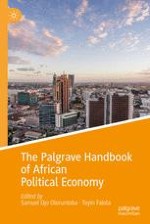2020 | OriginalPaper | Chapter
3. Four Journeys of Capital and Their Consequences for Africa
Author : Sabelo J. Ndlovu-Gatsheni
Published in: The Palgrave Handbook of African Political Economy
Publisher: Springer International Publishing
Activate our intelligent search to find suitable subject content or patents.
Select sections of text to find matching patents with Artificial Intelligence. powered by
Select sections of text to find additional relevant content using AI-assisted search. powered by
